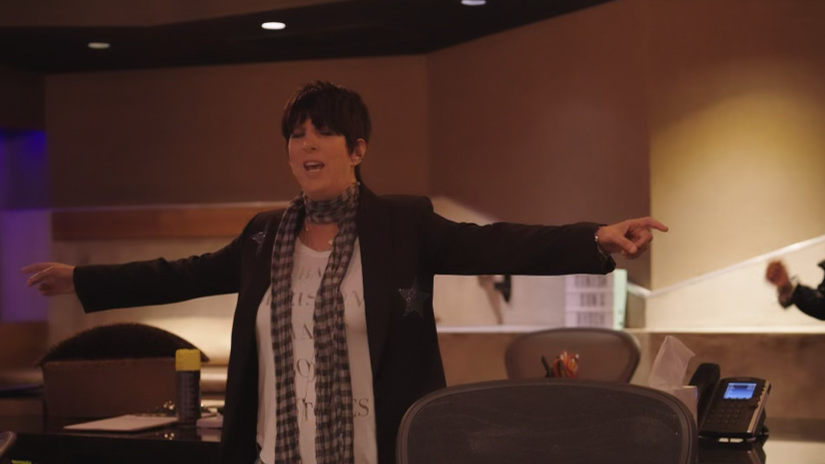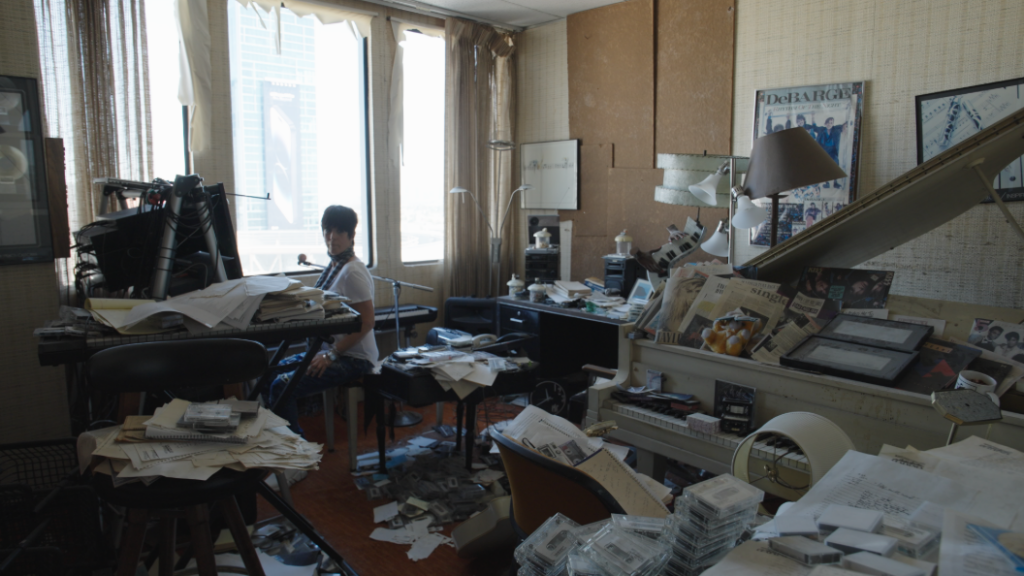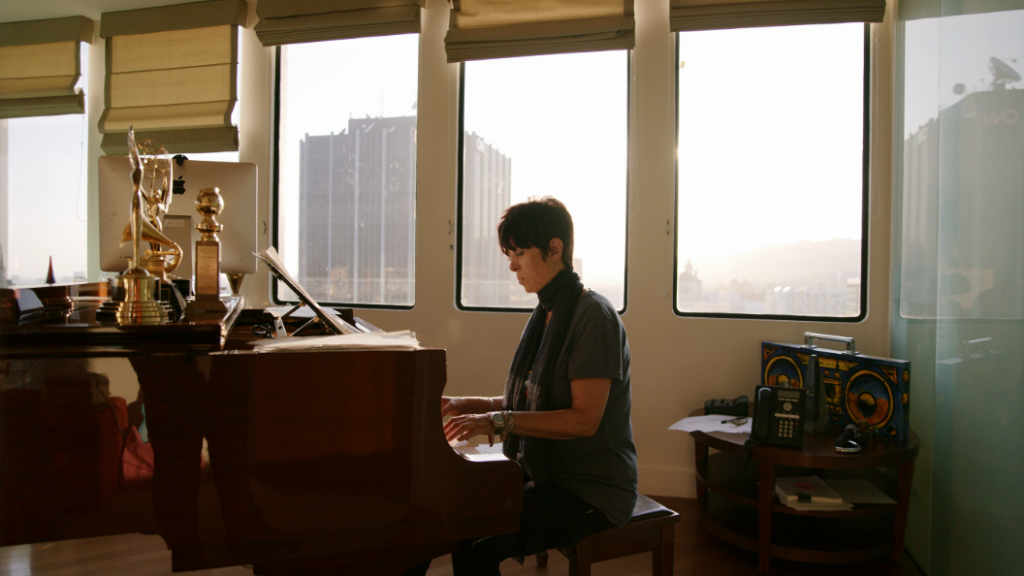Diane Warren is a complex and endearing figure in music history. Her documentary film Diane Warren: Relentless, helmed by documentary director Bess Kargman, dives into the kind, quirky electric life of one of music’s most enduring and important song creators.

By Cy White, Photos courtesy of Bess Kargman
Berry Gordy’s The Last Dragon is unapologetically my favorite movie of all time. No one can convince me that there’s a better film. I don’t care. A major part of my deep affection for the movie is its main single, DeBarge’s “Rhythm of the Night.” I remember very distinctly looking on the back of the record jacket, just so I could see the name of the song. (Yeah, I was that in love.) It was the group’s aptly titled Rhythm of the Night album, and I was obsessed!
When I became older, one of my greatest goals (as well as any middle schooler who could carry tune) was to be able to sing every song from Christina Aguilera’s eponymous debut album. Two of my favorite songs on that album, “So Emotional” and “I Turn to You,” were songs I would practice religiously, the point that both of those songs on the CD actually skip from the overplay. The bridge of “I Turn to You,” in particular, was what I whipped out when people asked me to sing because in that 30 seconds, I could showcase my range. Wore it out on the CD, I tell you!
One could say Diane Warren has been a part of my musical journey from the time I was born until this very moment. In fact, I’m sure I can safely say that about anyone born since 1985. In the ’90s, when I was growing up, there were two names that dominated the industry: Babyface and Diane Warren. Our childhoods exist in a memory capsule, with Warren’s immense discography making up no less than 90% of its soundtrack.
Imagine my absolute elation in learning about the documentary chronicling her journey with music, her life’s swoops, dips and plateaus, I was beyond elated. It’s about damn time someone told this incredible woman’s story. Documentarian Bess Kargman was just the director for the job.
Coming from a past in sports and dance documentary, Kargman’s experience lay in her ability to capture the frenetic energy of whatever subject she’s filming. Lucky for her that Warren never stops moving, never stops creating. Her entire existence is crackly energy. Seeing it play out on screen, the proverbial method to the madness, was a blessing I didn’t know I needed.
There will be no spoilers here, but Kargman sat down with me to delve into the experience of capturing the profound wildness of Diane Warren in all its messy, silly, genius glory.
Please introduce yourself.
Bess Kargman. I am the director of a new film premiering at the South by Southwest Film festival. The name of the film is Diane Warren: Relentless.
Most of your documentary work has been sports focused. What about Diane’s story made you say, “I need to tell this story”?
I started out making documentaries focused on dance, which has so much overlap with a music documentary in terms of the importance of sound and the importance of really doing a deep dive into an artistic world. Sports documentaries have overlap with that as well. Because my mantra as a filmmaker is that a story is only as good as its characters, it’s less about what the focus of the film is and more about who’s in it. Access is everything. So with all of my films, regardless of what they’re about, it’s really about, “Am I going to get unparalleled access?” and, “Is the character going to be interesting?” Diane Warren is no exception, and she did give us incredible access to her.
What drew you to Diane Warren specifically? How did you come to know her?
Well, I first came to know of her because as an 18-year-old freshman singing a capella at Amherst College, I was singing “Rhythm of the Night.” I told her that once, and she was like, “Really?” She loved that. Actually knowing Diane… I mean, this is a tangent, but it really means so much to her. When people approach her and say to her what her songs mean to them, she finds that more gratifying than anything else, really. So that was a connection I had to Diane without having ever even met her.

Going from there, to get back to your other question, I’ve always wanted to do a music documentary. Music is so important to me, even in my daily life. I was just chomping at the bit to have the right project come across my desk. The minute that I found out about this one, and I was vying for it against other directors, I knew I had to have it.
So I’m thrilled that I directed this film, not only because of my early connection with Diane’s music, but also because she has such a great personal story that doesn’t even anything to do with her hits. I could have told a great music documentary just about her music. But once you couple that with her personal story, it’s like, whoa, there’s a lot to unpack there.
What is one thing you learned about Diane that you not only didn’t know, but you think would surprise people who know her music?
Well, even a couple weeks into filming, I still did not know that Diane had been diagnosed with Asperger’s, that she’s on the spectrum. It didn’t really change anything, especially because she doesn’t feel it’s anything. She doesn’t really talk about it. Not like she’s hiding it, but more she finds it uninteresting. She’s like, “I’m just me,” Which is great. She’s just like, “I’m me, okay. So I’m now diagnosed. This is how I’ve always been as a child.”
People called her different. Now she sort of really celebrates that difference, and it wouldn’t have shaped her career path. It wouldn’t have shaped who she was had she not been different. So I did not know that she has Asperger’s. I know what a gift [it is]to have Asperger’s, because it’s led to such an incredibly intense focus on a life’s passion. There were a couple other things I didn’t quite know about her. I knew she was funny. I didn’t know she was really funny and self-deprecating and humble.
You’ve been between this world of focusing on dance, then athletics and now music. What are a couple things people might have misconceptions about when it comes to doing documentary filming?
There are some narrative film directors who maybe think that documentary filmmaking is easier because you’re not working with actors or dealing with a script and memorizing lines and stage direction. Documentaries are much harder to direct because you have to be so flexible to how someone’s life unfolds and have absolutely no manipulation in their life and in their story. Sometimes you really have no idea where a story is going to go or how a narrative arc is going to unfold. There’s so many uncertainties to the project, really, even to a shoot day. You have to have flexibility with documentary filmmaking, no matter what the topic is about.

You have to be able to deal with a lot of stress and anxiety in a shoot day. But also, even in the edit room, you have to be okay. Unlike a narrative film, which doesn’t have hundreds of hours of footage, with a documentary, you have so much extra footage to sort through. It’s like chipping off of a huge block of stone to make a statue or a sculpture. You really have to figure out what pieces of stone stay on the block and what can go. That’s really challenging.
From your experience, what do you want people to take away from this film?
What do I want people to take away from this film? It’s a great question. We have an incredibly diverse cast and crew. Basically everyone on this team, it’s like the United Nations. It’s really exciting to have such a great swath of people making the film. You are more than sum of your parts. I always chose people who are the best fit for their role and for their job. That happened to be a lot of women and a lot of diversity, and I’m proud of that. I chose the best people. Lo and behold, that was a lot of women and really people from all over, which is exciting. Even on screen, I made sure to have it reflect that, because that is Diane’s music. She loves all genres and all types of people doing her music.
Did you laugh and cry? I wanted the film to be this emotional roller coaster. You’re loving the music, and then there’s a surprise. Then you’re laughing and you’re crying and you’re just feeling it. The state in which you leave the theater emotionally is different than when you entered. Did the movie make you feel?
Any final thoughts?
Can I back up for a second and say the most important thing for me when making this film? I already knew we had the Diane Warren fans who would see this film. What is so exciting to me is someone who doesn’t really know who Diane Warren is, and then they are 25 minutes into the movie, and they’re like, “Wait a minute. She did that hit and that hit, but she can’t have also done that hit. That hit is so different from that hit.” You might not know her name, but, boy, do you know all of her songs.
That’s who I made the movie for. The people who really can’t believe that they know all of her music, even if they haven’t really heard her name.
As far as I’m concerned, Diane Warren Babyface had a chokehold on music for the better part of two decades.
Exactly! She bought Babyface’s building. Isn’t that a full circle thing for her life?


